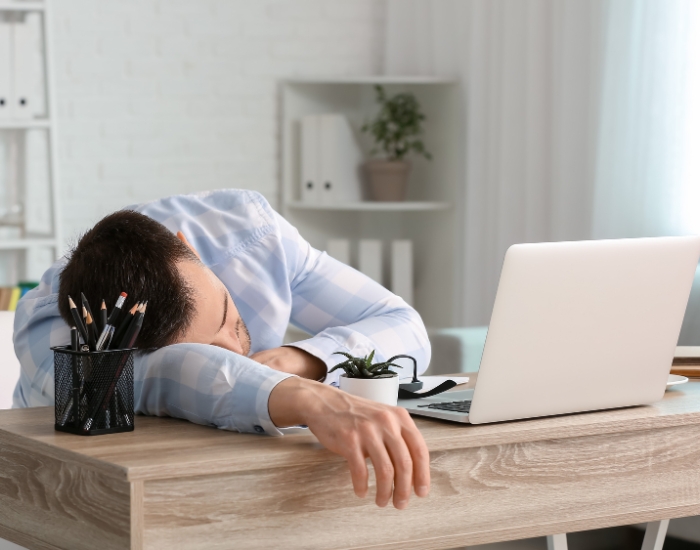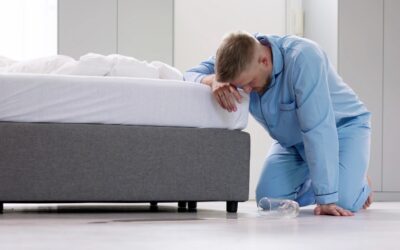There’s nothing more frustrating than feeling completely exhausted after a long day, only to find yourself lying awake at night, unable to fall asleep. If this sounds familiar, you’re not alone. Many people experience difficulty falling asleep despite feeling physically and mentally drained. Understanding the potential causes behind this can help you find solutions to get the rest you deserve.
In this blog, we’ll explore common reasons for this sleeplessness and provide actionable advice on how to manage and improve your sleep patterns.
Understanding the Sleep-Wake Cycle
To understand why you might be unable to fall asleep despite exhaustion, it’s important to first understand your body’s natural sleep-wake cycle, also known as the circadian rhythm. This internal clock regulates your sleep and wake times and is influenced by various factors, including light exposure, activity levels, and even your eating habits.
When this rhythm gets disrupted, it can lead to insomnia, even if you’re feeling physically tired. Common culprits include irregular sleep patterns, jet lag, or shift work. In these situations, your body may be out of sync with its natural rhythm, making it hard to wind down and fall asleep, even when you feel drained.
Stress and Anxiety: A Major Sleep Disruptor
If you find yourself lying awake with racing thoughts, stress or anxiety could be the main reason you can’t sleep. Mental health struggles, such as anxiety or depression, can significantly impact your ability to fall asleep, as they often trigger an overactive mind.
When you’re stressed or anxious, your body’s fight-or-flight response is activated, releasing stress hormones like cortisol, which can keep you alert and prevent relaxation. This constant mental state of alertness can make it incredibly difficult to “switch off” at bedtime, no matter how exhausted you feel physically.
If stress is a recurring factor, exploring relaxation techniques, such as mindfulness, meditation, or deep breathing exercises, can help activate your parasympathetic nervous system, which promotes relaxation and makes falling asleep easier.
Poor Sleep Hygiene: Are You Helping or Hurting Your Sleep?
Poor sleep hygiene is another common reason for sleepless nights. This refers to habits or routines that negatively affect your sleep. For example, using electronic devices right before bed can expose your eyes to blue light, which inhibits the production of melatonin, the hormone responsible for regulating sleep. Caffeine consumption late in the day or irregular bedtime routines can also disrupt your ability to fall asleep when you’re tired.
Improving your sleep hygiene can make a significant difference in your ability to fall asleep. This can include setting a consistent sleep schedule, avoiding stimulants before bedtime, and creating a calm, comfortable sleep environment free of distractions.
Medical Conditions Affecting Sleep
Sometimes, difficulty falling asleep even when exhausted can be a sign of an underlying medical condition. Conditions like sleep apnea, restless leg syndrome, or chronic pain can disrupt sleep, preventing you from reaching the restful stages of sleep, no matter how tired you are. Additionally, certain medications or treatments may have side effects that affect your sleep.
If you suspect that a medical condition may be interfering with your sleep, it’s important to consult a healthcare provider. They can assess your symptoms, provide a diagnosis, and help develop an appropriate treatment plan.
The Importance of Physical Activity
Regular physical activity can improve sleep quality and make it easier to fall asleep. However, exercising too close to bedtime may have the opposite effect, increasing adrenaline levels and making it harder to wind down. Aim for consistent physical activity earlier in the day, and avoid intense exercise in the hours leading up to bedtime.
Final Thoughts
If you’re constantly tired but can’t seem to fall asleep, it can have a significant impact on your health and well-being. Identifying the root cause of your sleep issues—whether it’s stress, poor sleep hygiene, or an underlying health condition—can be the first step toward finding a solution.
If these sleep struggles persist, don’t hesitate to reach out to the expert physicians at Careprime Clinic. Our team is here to provide personalized care, assess your specific situation, and help you find a path to better sleep and overall health.
Disclaimer:
The information provided in this blog is for educational purposes only and is not intended as medical advice. It should not be used to diagnose or treat any health condition. Always consult with a qualified healthcare professional for accurate diagnosis and treatment of any symptoms or medical concerns.




